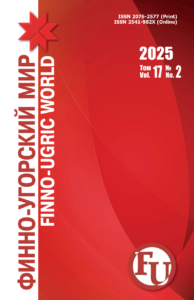Agafonova Nina A.,
Candidate of Sc. {Philology}, Associate Professor, Department of Mordovian Languages, Ogarev Mordovia State University (Saransk, Russia), ohanina@rambler.ru
Ageeva Galina M.,
Doctor of Cultural Studies, Professor, Department of Library and Information Resources, Ogarev Mordovia State University, ageevagm@rambler.ru
Akimova Zinaida I.,
Candidate Sc. {Pedagogy}, Director of the Secondary School
«Gymnasium № 19» (Saransk, Russia), saransk.19@mail.ru
Antipkina Elena N.,
Candidate Sc. {Philosophy}, Head of the Academic, Research and Practical Laboratory of Digital Processing for Multimedia Data, Ogarev Mordovia State University (Saransk, Russia), elana19@mail.ru
Ariskina Tatyana P.,
Candidate Sc. {Philology}, Associate Professor, Department of Finno-Ugric and Comparative Linguistics, Ogarev Mordovia State University (Saransk, Russia), ariskina82@mail.ru
Berezina Anna V.,
Senior Lecturer, Department of Philosophy, Ural State Forest Engineering University (Ekaterinburg, Russia), berezinanna@mail.ru
Boyarkina Lyudmila B.,
Candidate Sc. {Art history}, Professor, Folk Music Department, Ogarev Mordovia State University (Saransk, Russia), bojarkin_ni@mail.ru
Bratchikova Nadezhda S.,
Doctor of Philology, Head of the Department of Finno-Ugric Philology, Lomonosov Moscow State University (Moscow, Russia), n.bratchikova@mail.ru
Vlasov Alexander G.,
Head of Department of Military History and Search, State Budgetary institution, «Center «Patriot» (St. Petersburg, Russia), 79043310528@yandex.ru
Gudkova Svetlana P.,
Doctor of Philology, Professor, Department of Russian and Foreign Literature, Ogarev Mordovia State University (Saransk, Russia), sveta_gud@mail.ru
Guseva Elina V.,
Candidate Sс. {Philology}, Deputy Director, Institute of National Culture and Intercultural Communication, Mari State University (Yoshkar-Ola, Russia), guseva_elina@ mail.ru
Kevbrina Olga B.,
Doctor of Historical Sciences, Professor, Chair of the Humanities, Saransk Cooperative Institute (Branch) of Russian University of Cooperation (Saransk, Russia), okevbrina@rucoop.ru
Kleimenova Tatiana V.,
Chief Specialist of the Republican Civil Registry Office of the Republic of Mordovia (Saransk, Russia), zagsr@e-mordovia.ru
Klyueva Irina V.,
Candidate Sc. {Philosophy}, Professor, Department of Cultural Studies and Ethnic Culture, Ogarev Mordovia State University (Saransk, Russia), klyueva_irina@mail.ru
Kornishina Galina A.,
Professor of the Department of Russian History, Ogarev Mordovia State University (Saransk, Russia), g.kornihina@mail.ru
Kylasov Alexei V.,
Candidate Sc. {Cultural Studies}, Assistant Professor, Department of Management and Marketing of the Sports Industry, G. V. Plekhanov Russian Economic University (Moscow, Russia), kylasov@yandex.ru
Levina Natalia N.,
Candidate Sc. {Philology}, Associate Professor, Department of Finno-Ugric Literatures, Ogarev Mordovia State University (Saransk, Russia), lev-nataliyan@ya.ru
Mamontova Marina S.,
Candidate Sc. {Pedagogy}, Acting Head of the Department of Social and Cultural Technologies, Mari State University (Yoshkar-Ola, Russia), mamontova-ms@mail.ru
Mokshina Elena N.,
Doctor of Historical Sciences, Professor, Department of the Russian History, Ogarev Mordovia State University (Saransk, Russia), enm2112@mail.ru
Nesterova Nina V.,
Candidate Sc. {History}, Docent, Chair of the Humanities, Saransk Cooperative Institute (Branch) of Russian University of Cooperation (Saransk, Russia), n.v.nesterova@rucoop.ru
Pashkova Tatiana V.,
Candidate Sc. {Philology}, Associate Professor, Department of Baltic-Finnish Philology, Petrozavodsk State University (Petrozavodsk, Russia), tvp-1979@mail.ru
Pyanzina Olga N.,
Master’s Student, Department of Russian history, Ogarev Mordovia State University, (Saransk, Russia), rivezke@mail.ru
Pekshieva Marina V.,
Senior Lecturer, Petrozavodsk State University (Petrozavodsk, Russia), marpek@petrsu.ru
Romanov Daniil K.,
Senior Assistant, Department of Psychology, Ogarev Mordovia State University (Saransk, Russia), famylypost@mail.ru
Romanov Konstantin M.,
Doctor of Psychology, Professor, Department of Psychology, Ogarev Mordovia State University (Saransk, Russia), famylypost@mail.ru
Sidorkina Tatiana N.,
Candidate Sc. {Cultural Studies}, Director of the Institute of National Culture, Ogarev Mordovia State University (Saransk, Russia), ink.mgu@mail.ru
Sushkova Yulia N.,
Doctor of Historical Sciences, Professor, Chair of the International and European Law Department, Dean of the Law Faculty, Ogarev Mordovia State University (Saransk, Russia), yulenkam@mail.ru
Tarasov Aleksander A.,
Candidate Sc. {History}, Docent, Chair of the Humanities, Saransk Cooperative Institute (Branch) of Russian University of Cooperation (Saransk, Russia), a.a.tarasov@rucoop.ru
Teush Olga A.,
Candidate Sc. {Philology}, Associate Professor, Department of the Russian Language and General Linguistics, Institute of Humanities and Arts, Ural Federal University named after the First Russian President B. N. Yeltsin (Ekaterinburg, Russia), olga.teush@yandex.ru
Fomina Alina I.,
Under-graduate Student, Department of Philology, Ogarev Mordovia State University (Saransk, Russia), fominaali@rambler.ru
Yantsukova Tatiana V.,
Candidate Sc. {Philology}, Associate Professor, Department of Intercultural Communication, Mari State University (Yoshkar-Ola, Russia), stv79@bk.ru






















